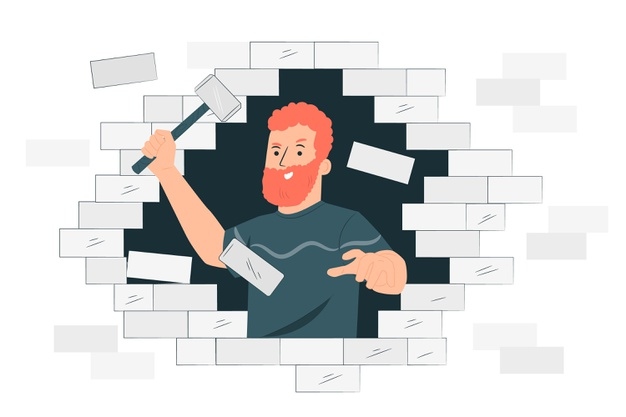If you own a business, there will have been times – probably many times – when you’ve encountered a brick wall that you’ve struggled to get past.
At times like these, entrepreneurs will normally look at external factors first. Perhaps the market isn’t in the best place, good employees have been too scarce, there are issues with the supply chain.
It’s a good place to start. But what if, having considered those external factors, your business is still flailing? At this point, it may be time to look inward.
Approximately 20% of new businesses fail during the first two years of being open, 45% during the first five years, and 65% during the first 10 years
|
While we cannot control the world around us, we can control how we react to situations and circumstances. In many cases, the health and wealth of our businesses hinge on how efficient, self-aware, and brave we can be.
Here, we’ve identified five common barriers to success; all things that may be keeping your business small.
1. Procrastination
|
2. Busywork
|
3. Interruptions
|
4. Not knowing yourself
|
5. Fear
|
1. Procrastination
“I love deadlines. I love the whooshing noise they make as they go by.” – Douglas Adams
When you’ve just spent an hour clearing your inbox, rearranging files, or reconciling expenses, you get a pleasing hit of satisfaction. But there’s a strong argument that any time spent on low-value tasks has a high cost to the growth of our businesses.
Procrastination is a trickster: it can seem like efficiency. But when those easy, low-value tasks divert our attention away from something more important, there’s a problem. By definition, procrastination means we’re putting something else off. So, when the urge to spring clean your office next strikes, as yourself why. What is that you might be seeking to postpone?
There is a psychological phenomenon known as ‘hyperbolic discounting’ which shows most people have a tendency to choose quick and easy rewards they’ll get in the short-term, over larger rewards that require a long-term effort. But that won’t get you anywhere.
A 2013 study proposed that procrastination can be envisioned as prioritizing the regulation of the mood of the present self over the consequences to the future self.
|
If you believe procrastination may be killing your efficiency, there are a few different methods you can try based on why you are procrastinating.
Are you overwhelmed? What does your to-do list look like? If it’s longer than three items, or if one big, intimidating task keeps getting pushed to the bottom of the pile, then you need to spend some time refining your list.
Delegate anything you possibly can, cut anything surplus to requirements, and take on no more than three tasks per day (ideally fewer). For the unwieldy, unmanageable items on your list, break each one down into smaller goals with actionable steps.
Are you lacking energy or motivation? You may be in need of higher quality breaks and time away from your screen. Sometimes the best way to be efficient is to not work at all.
Are you feeling indecisive? When faced with decisions that will have huge consequences for your business or dealing with a really complicated issue, it’s sometimes better to do something else, and come back to it later.
Delaying your decision making can be a powerful move: the circumstances might shift making your decision easier, but also your subconscious and conscious mind will be working on the problem while you wait.
While we’ll touch on this a bit more when we discuss fear, decisional procrastination is often not as habitual as other kinds and, in the meantime, you can examine your options and speak to mentors or people you trust.
2. Busywork
“There is nothing so useless as doing efficiently that which should not be done at all.” – Peter F. Drucker
A business owner’s attention is in high demand and learning to differentiate between important tasks from those that seem urgent is a critical skill for time-poor entrepreneurs to master.
There are certain jobs that only you can do, but things like admin, small scale market research and dealing with customer issues are all tasks that can and should either be completed by other people or automated, leaving you to focus on growth.
Busywork is anything that consumes your time but that which doesn’t directly move your business forward, and it must be avoided at all costs!
In the UK, CEOs waste almost two hours per day (111 minutes) on routine tasks that could be done by technology. This amounts to 54 wasted working days a year for the most time-starved individual in your company: you.
|
The solution
Start by automating anything repetitive. Perhaps that means moving from spreadsheet accounts to a cloud-based accounting platform that creates reports and makes logging expenses easy.
Anything that cannot be done by a machine or software system should be delegated to a human. If you don’t have employees yet, use a virtual assistant or a specialist freelancer that you trust.
Should I really be doing this task?
Is this task important enough that it would move my business closer to one of our goals, or would it directly contribute to our growth?
Yes: do it yourself
No: delegate it
Your focus needs to be on making the maximum impact on your business with the limited time you have.
3. Interruptions
“The major problem of life is learning how to handle the costly interruptions. The door that slams shut, the plan that got sidetracked or that lovely poem that didn't get written because someone knocked on the door.” – Martin Luther King Jr.
Interruptions – from people, technology, or our surroundings – are an inevitability. In the office it’s usually people stopping by for a quick chat, at home it’s the dog or the mailman. And just about everywhere there’s little escape from shrill phone notifications or incoming calls. It’s what we do about interruptions that counts.
The best thing you can do is to minimize the risk of interruptions happening, especially when you’re about to start a period of deep, focused work. Here are some ideas:
- Share your calendar with your team, and assign two or three ‘do not disturb’ slots in your day. Let them know you’re available for a quick chat at any time apart from during those sessions. You could also trial a daily ‘communication hour’ when everyone knows you are open for a chat or call.
- Go into settings on your phone and computer and turn off notifications.
- Likewise, turn all electronic devices to silent or, better still, switch them off for your deep work sessions.
- If possible, put a note on the door for the mailman to leave your package in a safe place instead of ringing the doorbell.
- Walk the dog before your deep work session!
If you find environmental factors the biggest problem, you can manipulate your surroundings to minimise noise or chaos.
Try soundscapes and music to create your perfect productivity zone. According to a 2014 study by Mindlab International on behalf of MusicWorks, 88% of people were found to have improved accuracy and 81% completed their fastest work when music was playing in the background. It also revealed a positive correlation with productivity: when listening to music, nine in 10 people performed better.
Sometimes it’s silence that people struggle with. In this case, use music or ambient soundscapes to replicate familiar working environments and drown out unwanted noise.
Try noise-canceling headphones if you work in a noisy, busy environment – which will also indicate to other people you need to focus.
Also be aware that, just like procrastination, we often go looking for interruptions. When we start a difficult task, it can be really tempting to search for a way out. Often, we’ll turn to email and tell ourselves that dealing with our inbox is more pressing. It’s not.
Alter how you deal with emails. Assign a slot towards the end of each day turn to your inbox and start answering all the messages that come in throughout the day instead of breaking away from your task every single time you stray from your task or hear a notification.
It takes around 23 minutes to refocus and return to your original task after an interruption.
|
The success of your business hinges on your ability to use the limited time you have in the best possible way.
4. Not Knowing Yourself
“Knowing yourself is the beginning of all wisdom.” – Aristotle
Self awareness is perhaps the most important asset in business. If you can’t recognise your weaknesses, you’ll never understand how to best optimize your strengths. Plus, knowing yourself can help with your early hiring strategy: you can find people who are specialists in the areas you’re not, and fill in your blind spots.
Being self aware can also help us to get the most out of every working day. If you know you’re next to useless before 10AM or between the hours of 4PM and 5PM, then you can plan a working day that maximizes your productivity highs and allows for your lows.
One study that examined c-suite and individuals in executive positions found a high self-awareness score to be the strongest predictor of overall career success. The report stated: “This is not altogether surprising as executives who are aware of their weaknesses are often better able to hire subordinates who perform well in categories in which the leader lacks acumen."
|
Sir Richard Branson, one of the most successful entrepreneurs in human history, recently declared that he hadn’t understood the difference between net and gross profit until he was 50-years-old, when someone explained the concept to him using a fishing net and some pieces of paper.
Did he beat himself up over it? No. Branson has always been aware that he doesn’t have the head for the financial matters and he delegates those jobs to other people. In fact, he felt so inexperienced when he started a record shop with his friend Nik Powell that the pair decided to name their company Virgin.
To increase self awareness, you need to make it a project: study yourself and how you work.
The great thing is that you can start improving it today. This isn’t about going on a retreat to ‘find yourself’, this is about noticing and observing small things that repeat.
First, try creating a list of statements that reflect how you work. Here are some examples:
- I do my best work between 6-8AM in the morning.
- I skip lunch too often and when I do I feel too tired to work past 3PM
- I procrastinate if a task is too big or requires a lot of brainpower
- I never get much done on Friday, especially in the afternoon
- If I have too many meetings in the morning, it wrecks my whole day.
- If I do some exercise before work, I concentrate better all morning
- If I drink even one glass of wine in the evening, I’ll feel groggy until 11AM the next day
- My brain doesn’t seem to work at 4PM for about half an hour
If you can write your own list, you can then use it to create a list of actionable rules and principles that can help you plan your day. If your brain doesn’t work at 4PM, you could be scheduling an hour’s walk or a yoga session. If you work best in the early morning, why not make your core hours 6-2? (There have to be some perks to being your own boss!)
5. Fear
“In a moment of decision, the best thing you can do is the right thing to do, the next best thing is the wrong thing and the worst thing you can do is nothing.” – Theodore Roosevelt
Fear can do two things: cripple us or fuel us. No-one wants to admit that they are scared, but when you postpone making big decisions and distract yourself with simpler tasks, the problem is often fear.
Fear can make us procrastinate, freeze or undervalue our products and services, even if we can’t really articulate what we’re fearful of.
Being an entrepreneur comes with so many risks and expectations. You don’t want to let down the people who rely on you and you don’t want to prove your doubters right.
But fear can keep us small.
Studies have found that when fearful people make decisions they are more likely to consider the future to be pessimistic. Fear also introduces a sense of low certainty and a low sense of control into those making decisions.
|
The solution
Some fear is good, it can sharpen our focus and it lets us know what danger is afoot. We can use fear as both fuel and a force for growth, instead of a barrier to your success.
Here’s how to do it:
- Feel the fear, admit that you feel it.
- Confront it: acknowledge and write down the source of that fear
- Consider your two options: what will happen if you do react to the fear and if you don’t
- Choose one option immediately
- Leave the fear behind you
By carefully managing it, you can turn fear into positive energy that can help you perform at your best and achieve more. Don't let fear get to you!







